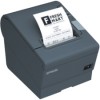Epson C31CA85090 Reference Guide - Page 106
Functions of each connector pin, Pin no., Signal name, Signal direction, Function
 |
View all Epson C31CA85090 manuals
Add to My Manuals
Save this manual to your list of manuals |
Page 106 highlights
Functions of each connector pin Pin no. Signal name Signal direction Function 1 FG - Frame ground 2 TXD Output Transmission data 3 RXD Input Reception data 4 RTS Output Equivalent to DTR signal (pin 20) 6 DSR Input This signal indicates whether the host computer can receive data. SPACE indicates that the host computer can receive data. MARK indicates that the host computer cannot receive data. When DTR/DSR control is selected, the printer transmits data after confirming this signal (except if transmitted using some ESC/POS commands). When XON/XOFF control is selected, the printer does not check this signal. Changing DIP switch 2-7 lets this signal be used as a printer reset signal. When you use this signal as the printer's reset signal, the printer is reset when the signal remains MARK for a pulse width of 1 ms or more. 7 SG - Signal ground 20 DTR Output 1) When DTR/DSR control is selected, this signal indicates whether the printer is BUSY. SPACE status Indicates that the printer is ready to receive data. MARK status Indicates that the printer is BUSY. Set BUSY conditions with DIP switch 2-1. 2) When XON/XOFF control is selected, the signal indicates that the printer is properly connected and ready to receive data from the host. The signal is always SPACE, except in the following cases: During the period from when power is turned on to when the printer is ready to receive data. During the self-test. 25 INT Input Changing DIP switch 2-8 enables this signal to be used as a reset signal for the printer. The printer is reset if the signal remains at SPACE for a pulse width of 1 ms or more. 106















